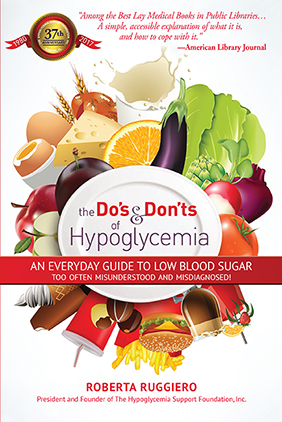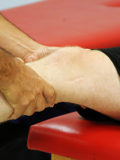By Roberta Ruggiero
 As a young mother who lived on sugary cakes, hot fudge sundaes, and hot apple pie and alternated between not eating meals and consuming ones that consisted mainly of pasta and bread, I obviously had no idea of sugar’s adverse consequences. I suffered from chronic fatigue, insomnia, severe depression, and headaches so intense that it felt like my head was going to explode.
As a young mother who lived on sugary cakes, hot fudge sundaes, and hot apple pie and alternated between not eating meals and consuming ones that consisted mainly of pasta and bread, I obviously had no idea of sugar’s adverse consequences. I suffered from chronic fatigue, insomnia, severe depression, and headaches so intense that it felt like my head was going to explode.
Trying to figure out what was wrong, I visited dozens of doctors, endured countless tests, swallowed thousands of pills, and was even subjected to the administration of electroshock therapy. But nothing eliminated my symptoms. In fact, I felt worse and was in a state of despair.
Finally, a simple glucose tolerance and proper diagnosis started me on the road to recovery. I found a physician who discovered that I had a severe case of functional hypoglycemia (low blood sugar) and just needed a specialized diet!
The Hypoglycemia Support Foundation was born almost 40 years ago as a result of my experience with this debilitating illness and the lack of awareness in the medical community. I dreamed of starting a support group for people with hypoglycemia but was plagued by fear, doubt, and insecurity.
After all, I wasn’t a doctor, a nurse or even a college graduate, so how could I possibly start an advocacy group for a disease that many in the medical field didn’t acknowledge or understand? But I had lived through the devastating effects of hypoglycemia and understood it intimately.
Unfortunately, what happened to me then is still happening today! Alarmingly, according to leading authorities, 80 million Americans have hypoglycemia and most don’t even know it! I receive almost 500 emails a month from all over the world. Most are requests for information, support, hope, and encouragement on how to deal with hypoglycemia. It has no age barriers and affects the very young, the very old, and all ages in between.
My message is simple: Your Symptoms may not be “all in your head.” If you suffer from fatigue, insomnia, mental confusion, nervousness, mood swings, faintness, headaches, depression, phobias, blurred vision, inner trembling, outbursts of temper, sudden hunger, heart palpitations, cravings for sweets, allergies, and crying spells (just to name a few), you may have functional hypoglycemia. And it is most likely a result of your poor diet, stress, and lifestyle.
Reach out to family and friends and also start to build a team of health professionals. You will need support, encouragement, guidance, determination, and persistence if you want to take control of your hypoglycemia before it takes control of you!
Education Is the Key
If you suspect that you have hypoglycemia, first educate yourself on this condition. Use the internet but remember that not everything available on the web has been vetted or verified. Read every book you can get your hands on that discusses the subject. One may contradict another; others will be confusing and difficult to understand. Nevertheless, you will learn something from each of them.
Remember, too, that you don’t have to absorb everything all at once. Read a chapter, a page, or a few paragraphs at a time. Learning takes time, energy, patience, and commitment. Don’t give up. Just do it gradually and consistently. Don’t say you don’t have the time or ability—you do! I cannot stress enough that knowledge and understanding of the causes, effects, and treatment of this condition are imperative.
A Diet and Symptom Diary Is Imperative
Then start keeping a diet and symptom diary—a daily account of everything you eat for one week to 10 days. In one column, list every bit of food, drink, and medication that you take and at what time. In the second column, list your symptoms and the times at which you experience them. Very often, you will see a correlation between what you have consumed and your symptoms.
Proper Diagnosis and Treatment Plan
Now make a list of your symptoms and bring it to a health care professional, along with your diet and symptom diary and also the questions and concerns generated from all your reading on hypoglycemia. There is no substitute for a medical diagnosis and treatment plan!
Simple Suggestions for Stabilizing Your Blood Sugar
- Start and end the day with protein.
- Limit juices, especially orange juice. They’re full of sugar.
- Plan your meals. Make some meals ahead of time over the weekend. Freeze some for those times when you have no time to cook and might be tempted to grab fast food.
- Always carry a protein snack, such as almonds or string cheese, with you … especially when traveling.
- Watch your exercise routine! Don’t exercise on an empty stomach. It can lower your blood sugar. Pay attention to how exercise affects your symptoms.
- Carry a Health Emergency Identification Card with you at all times.
Most importantly, never give up or give in. You can do it!
Roberta Ruggiero is the author of The Do’s & Don’ts of Hypoglycemia: An Everyday Guide to Low Blood Sugar Too Often Misunderstood and Misdiagnosed! ©2017, 5th edition, published by Frederick Fell Publishers Inc, paperback. She is the president and founder of The Hypoglycemia Support Foundation, Inc.











